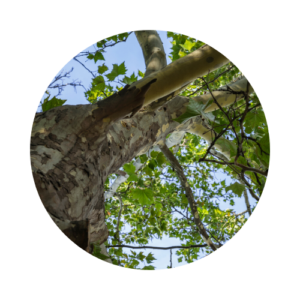Soon after we moved to Virginia, we began attending a church that met in a restored and reclaimed barn, still bright red. Sunday school classes met in the farmhouse, a classic white.
I loved the history and architecture of these spaces. I was proud that we had repurposed rather than demolished them; it felt that something vital was preserved and honored. In this space, the annual nativity felt so much more authentic, so rich and meaningful. I connected deeply with the stable turned sanctuary from the old hayloft of our barn turned church.
The spacious church grounds, part of the old farm, frequently hosted large church picnics with plenty of hamburgers and watermelon, water balloons and slip and slides.
Many well-established trees shaded the farmhouse with extensive canopies, and the best were the sycamores lining the path between sanctuary and classrooms, barn and farmhouse. It took five or six children holding hands to circumscribe their trunks and speculating on their age was a favorite activity. We whisperingly confided to each other that they may have been around before George Washington. This sweeping claim was guarded from the adults; no one wanted to be mocked and none of us felt too sure of our timelines.
I climbed the sycamores at every opportunity.
Disregarding scraped shins and heedless of Sunday dresses, I would answer the call of their giant, glossy gold leaves waving a sincere but lazy welcome, and climb to the highest branch I thought I would be allowed to occupy. There I would lean my cheek against the mottled mosaic of the bark, savoring its many textures due to the distinctive way it peeled—the topmost layer just weakly clinging to the lower layers and ready to snap off in a highly satisfying yet guilt-inducing way at even a light brush of my fingertips.
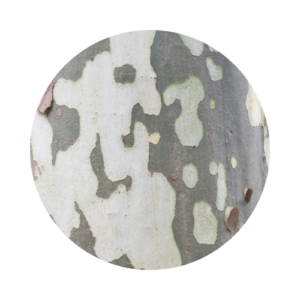
I was never quite sure what harm this would do to the tree, but it seemed that it couldn’t be much if I confined myself to peeling only small sections. In the fall I tried to spot the compact balls—more golden and powdered than sweet gum balls—that hung hidden amongst these leaves, attracting squirrels and bearing the promise of new sycamores.
As people milled below carrying on their Sunday conversations, I traced the meandering progress of ants following invisible trails, circling and re-circling the stately limbs. There was no Sabbath rest for the ants. And while we sluggards were advised to learn of the ants, I wondered if possibly the ants could use some lessons in efficiency. It seemed that a straight path would make more sense, allowing them to conserve their efforts and perhaps permit a little rest, anyway, without ruin rushing in.
I spent most of my time at church observing. While I did make friends fairly quickly, after I had gotten over the shame of being a Cowboys fan in Redskins country, I never shook a sense of being slightly out of place. I felt at home in the landscape, but I felt a stranger among the crowds.
Climbing the tree both to get away and to be seen, I relished overhearing comments about me. I liked to be known as strong, brave, and adventurous. With my arms wrapped securely around the sycamore, I enjoyed watching and listening to the milieu below me and savored the sense of being slightly above them.
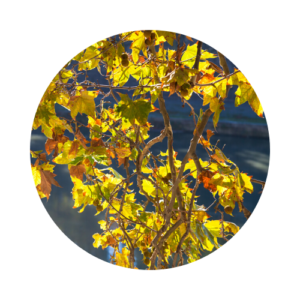
When I descend from the security of the treetops in my memory and recall the children clustered around the Sunday school tables and under the sycamore tree, I feel shame.
Just around the farmhouse from the sycamores stood a swing set taller than I had ever seen. The most powerful and experienced swingers could actually hang in the air for a moment level with the power lines that crossed the farmyard nearby. Getting a chance on the swings was a rare and coveted privilege.
One day, Christy, a little girl who attended Sunday school irregularly and none of us really knew, got her chance.
She stood out with her flaming red-orange curls, matted with tangles, and bright pink dress with sleeves that exposed thin wrists that, like her face, were spattered in freckles. Those freckles broke into a delighted smile when she realized she was being offered an unexpected chance, and she pumped her way to the sky with ardor and enthusiasm.
Suddenly, among the children still on the ground, hesitant giggles and whispers traveled like electricity. With the confidence of cruelty backed by a crowd, whispers turned to shouts. “Christy isn’t wearing any underwear!” Everyone’s eyes turned towards Christy as her face, jaw set, eyes flashing, matched her hair. It was true. Horrifyingly, undeniably true.
Desperately unhappy for her, I didn’t know what to do. I felt her agony and admired her proud silence. I wondered if maybe she was too poor to own underwear, if it was a cultural difference—her father, much older than all of our fathers, was from far away, I wasn’t sure where—or if it was just a horrible oversight. In any case, it was none of our business and laughing, mocking, and pointing was a torture that I couldn’t abide.
Yet, I didn’t know what to do. The particular children involved were already not my friends. I had no reason to believe I would have any influence with them. I felt I too would be a laughingstock as I shrilly castigated them, and that my efforts would prove fruitless anyway. I remember the frantic, smoldering rage and feeling intensely that this scene must be stopped, but at the same time feeling utterly inadequate.
I turned away toward the sycamores, toward peace and safety.
Christy, oh how I wish I had brought you away with me. I wish I had flown at those children and driven them away from you. I couldn’t take away their words, but you would have known you were not alone. You would have known that someone cared. You would have known you were loved. I am so sorry.
Like the sycamore climber of old, I wish to repay fourfold. I know it’s not enough, Christy, but it’s all I can do.
I will examine my own heart and repent of staying silent when others are being hurt.
I will confront abuse.
I will comfort and seek justice for the abused.
I will teach my children to do the same.
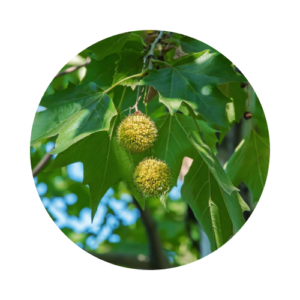
The next time I climbed a sycamore tree was twenty years later. It was midsummer and my favorite week of the year—the week my two youngest sisters, Kristen and Carrie, came to spend with me.
Until summer jobs eclipsed the possibility, The Little Girls, as our family had affectionately christened them, spent between one and four glorious weeks with me each summer. If it is possible, my daughter, eight and four years younger than the girls, enjoyed these weeks with them even more than I did.
We took long hikes, the girls often barefoot, maintaining their carefully cultivated “summer feet” impervious to stones, roots, and thorns. We ate brie and berries and cookies and not much else. We read aloud: Hans Brinker, Eight Cousins, Girl of the Limberlost, The Little Prince, The Golden Key. We played games. We laughed. We loved.
Josh, Gaeligh, and I had just moved to Frankfort, Kentucky that summer into a beautiful historic home tucked in a bend of the Ohio river. During our week together, the girls and I had been exploring our new town.
The award-winning private iris garden at the corner of our street which was equally inviting and forbidding.
The immaculate public garden and grounds of the Orlando Brown house which came with a boon dear to my heart—every tree and plant was labeled.
The bustling farmers market with its kaleidoscope of produce and flowers.
Possibly best of all, the downtown bookstore with creaking floors, sliding ladders to reach the top shelves, thought-provoking quotations framed on the walls, an attic full of fragile and beautiful used books, and a door that opened into a coffee shop serving gigantic slices of German chocolate cake and pouring up Mexican hot chocolate with just the right kick.
Today, with an afternoon as free and open as the brilliant blue sky above us, we were visiting an open space planted with native plants and flowers, bordered by forest on one side and a steep karst bluff on the other. As we walked the paved trail around the central garden, we lingered under the sycamores sporadically towering near the cliff’s edge to escape the shimmering heat of the sun.
Passing the last in the row, we found the lowest branches were just low enough to reach, and with one accord, we scrambled delightedly into the embrace of the sycamore. It felt like coming home.
After we each found a perch suited to our separate strength, we dangled our feet from solid branches that effortlessly supported our weight, branches clothed in mottled bark and arrayed in opulent green and gold leaves that shivered lightly in the breeze, rustling deliciously of secrets so deep they mustn’t be told, but can only be felt.
We breathed in the prickly, dusty scent of the bark. Drank in the fresh, marvelous green of the leaves. Delighted in the spiked seed cases dangling just out of our reach.
At the base of the sycamore rolled the wildflower garden, smelling of summer but foretelling fall in its tangled glory of whispering grasses and nodding blooms, fading, yet vivacious until the end. The sycamore, our splendid, generous host, provided shade while allowing the occasional shaft of sunlight to burst through its canopy, my skin suddenly dappled and glowing and warm. Above us, endless, immeasurable sky.
For the hour we shared in the sycamore, perched between wildflowers and sun, we were of the world but not in the world. We knew only joy. We felt only belonging. We were only and exactly ourselves.
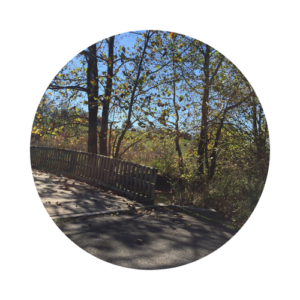
Three years later, in Blacksburg, Virginia, I went for my first real walk after my son Finnegan had been born a month earlier.
My daughter Gaeligh, Finnegan, and I had stopped at the farmers market that magnificent October afternoon, and on a whim, decided to explore a trail across the street that we had noted before but never taken.
Gaeligh and I were looking for moments to connect, or really reconnect, with each other now that Finnegan had disrupted the quiet rhythms of our life together. After eleven years of savoring a leisurely companionship, accommodating this new addition, beloved as he was, often felt strange and disruptive.
As we meandered through rolling hills, we chatted and laughed, taking turns carrying Finnegan—Gaeligh, so strong and tanned and lithe yet so gentle and tender with her brother, so protective of me and my returning strength. Bathed in light, her thick brown hair glowed bronze and copper.
There is a special quality of sunlight on fall afternoons when the visiting rays feel almost palpable, alive. Light pours forth, golden, rich, and heavy. It stretches across the landscape, a glowing gossamer thread woven into a tapestry ethereal—revealing not concealing. Uncovering a world more deeply real than anything seen under other lights.
From a distance, suddenly visible as we crested a hill, the stand of sycamore trees was glorious—their trunks rising gracefully from the creek bed, their leaves as richly gold as the light.
My heart always quickens around sycamores. I told Gaeligh we would walk at least to the bridge passing between them, maybe stop to rest on the bench just beyond. We ambled past blackberry canes, this year’s fruit already consumed or shriveled. Gaeligh scattered milkweed tassels on the dazzling breeze, pulled from pods ripe and bursting with seed.
As we approached the glory of the wooden footbridge flanked by sycamores, we caught the sharp stench of death on our side of the bridge. A doe, her hindquarters torn, lay in the creek. We crossed quickly, holding our breath, and could not stop at the bench. Passing through death, there’s no time to rest.
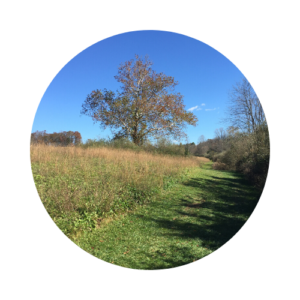
We returned to this trail and others connected to it frequently over that fall, as I wrestled with questions insistent yet unvoiceable. Who am I? Now that this little one depends on me? Now that I have given myself for him? Who am I?
I had been injured during Finnegan’s birth. Facing the reality of my new limitations was a slow and heartbreaking process. Rejoicing over my precious boy felt clouded by regrets that I would never be the same. He would never know me as I was before. And never again would I. I felt shaken, shrunken, small, weak and I wondered when or if I would ever feel strong.
Turning a bend in the trail, I caught my breath at the vision of a tree, hosting life and proclaiming life. A glorious tree, firmly planted by streams of water, bearing fruit in its season, unfurling leaves that do not wither. A vision of purpose and possibly, of strength and promise, even while providing life for those around me.
Yet my leaves do wither. Over the years of caring for Finnegan, who turned out to have unexpected health issues of his own that required intensive round-the-clock care for many months, I have become physically fragile and very weary. My children prosper, but I am poured out.
I cannot retreat to the sycamore in the face of this challenge; instead, I am asked to be one. A place of safety, a place to thrive, a place to feel and know love. My little one consumes my fruit as fast as it appears, but my roots are firmly planted, and this season will pass.
